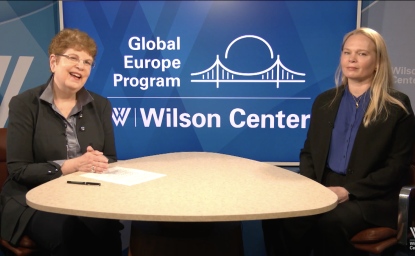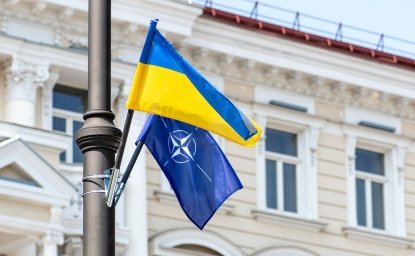213. Making EU Enlargement Work

Europe is currently enjoying an unprecedented level of integration and unity in a number of key areas. Among some of the most important elements of an integrated union, the EU has achieved:
- a common commercial policy;
- a single market;
- a common foreign and security policy;
- a single currency (Euro); and
- a European judicial system.
Given the recent progress the EU has made on internal integrative measures in these key organizational areas it is harder to join Europe now then in the past. Regardless, Mr. Cameron states, Europe will expand within this decade. Indeed the process is well under way, started shortly after the fall of communism in the early 1990s with the signing of association agreements with certain Central East European countries and continued with the recent stabilization and association agreements signed with the former Yugoslav states. The EU also has free-trade agreements in place with nations of the European Free Trade Association (EFTA).
Against this background, Mr. Cameron identified several long-range challenges for the EU, similar to those the U.S. faced in its first 50 years:
- the expansion of territory;
- the question of national sovereignty versus the growing powers of the Union;
- free trade versus protectionism; and
- the ongoing debate over those "in" and those "out" on key policy issues such the single currency and Schengen, both issues on which the British and Danes have opted out. A developing variable geometry is becoming increasingly evident within the European Union.
Currently, the European Union is bolstered by the fact that there is no major outside threat. With the recent developments in Serbia, Europe is finally at peace within itself and can concentrate on integrative issues like fully implementing the single Euro currency, which remains a major source of debate. Difficult debates are similarly expected in areas such as the size of the European Commission, and how some states or groups of states can move ahead on flexible cooperation. These "Amsterdam leftovers" will have to be cleaned up and cleared at the Nice summit this December before any further talk on enlargement can proceed.
The main challenge is deciding what kind of Europe is envisioned in the long-term and how to ensure stability after enlargement. Mr. Cameron posits three possibilities:
- implosion (the least likely of the three) - where Europe absorbs more than it can handle;
- the introduction of a formal constitution of the European Union outlining the rights and responsibilities of its centers of power and decision-making; or
- evolution as it has been doing, in ad hoc, pragmatic fashion.
In order for enlargement to occur, the EU has identified three main criteria to be satisfied by each potential member country. The aspirant state must:
- be democratic with a stable political system in which the rule of law and human rights are respected and extended to all citizens and where minority rights are guaranteed;
- have a functioning market economy able to withstand the economic competition and pressures of the EU internal market as well as the global market; and
- demonstrate the ability to take on the 80,000 pages of laws and regulations (aquis communitaire) of the EU. This is particularly problematic for all aspirants countries due to the overall lack of necessary institutional bureaucracy and trained professionals to handle the massive bundle of EU regulations.
Within the past few years, the criteria for admission have recently expanded to include other potential problem areas: the safety of nuclear energy and the environment; the resolution of border disputes; and an efficient and functioning judicial system. Currently there are a select number of countries engaged in accession negotiations at an advanced level. Often referred to as the Luxembourg Group they include: Estonia, Poland, Czech Republic, Hungary, Slovenia, and Cyprus. Negotiations are just getting started with Latvia, Lithuania, Slovakia, Romania, Bulgaria, Malta, and Turkey.
According to Mr. Cameron, the negotiating process is separate for each country and no fixed dates for accession have so far been set. For its part, the EU has made a formal announcement that it will be ready to enlarge by 2002-2003. Cameron stated that it is unlikely that any of the candidate countries will meet their self-imposed, hopeful dates for EU membership within this time-frame. He points out that currently, no aspirant country has completed more than half of the thirty-one chapters necessary for EU compliance and each has yet to address the more sensitive issues of agriculture and environment. Furthermore, even in the unlikely event a country were to complete all requirements for admission to the EU by 2002-2003, it would take at least another year to ratify and implement this decision by each of the EU's member states.
Despite the separate negotiating process with each of the candidate countries and the general slow progress of accession negotiations, Mr. Cameron, speaking on a personal basis, states that one scenario might be a "package deal," but not before 2005. This package deal would possibly include an 8 + 2 configuration consisting of: the three new NATO members and the three Baltic states, plus Slovenia, Slovakia, Cyprus, and Malta.
For this to happen, Mr. Cameron underlines the need of both the EU members' national leaderships as well as the candidate countries' governments to sell the mutual benefits of enlargement to their respective publics. This is a win-win situation for both parties concerned. EU enlargement will guarantee the peace and stability of the entire area as well as the rights of all encompassed minorities. Furthermore, EU expansion will bring the entire region in more direct compliance with international environmental and human rights regulations as well as help stop and control the rampant spread of crime and corruption in the Balkans. Mr. Cameron expressed a belief that this will be a much easier task to accomplish once all of the East European countries are within the EU. Russia and Central Asia also need to be assured that an enlarged European Union will guarantee a more stable and secure Eastern Europe and that there is no direct correlation between EU and NATO enlargement.
Ultimately however, Mr. Cameron believes that there will be a need for a convergence of membership between the EU and NATO - namely that all European countries be NATO members. This will culminate in a U.S.- European common security policy. The EU, Mr. Cameron asserts, could play the part of interlocutor for the U.S. in ten to fifteen years time. He gives as a telling example the EU's development of a Rapid Reaction Force. According to Mr. Cameron, the EU is best placed both geographically and economically for dealing with such regional issues as promoting the stability of failed states, dealing with problems of economic dislocation, resolving ethnic disputes, addressing local environmental issues, and handling cross-border disputes. This stance is also in keeping with recent U.S. policy in the Balkans and the American desire for greater European involvement in and responsibility for the region.
According to Mr. Cameron, Article 5 of the NATO Treaty guaranteeing collective defense and security is increasingly proving irrelevant in the new European environment - with the fall of communism and the weakening of Russia there is no real, perceived military threat to Europe. Instead, Mr. Cameron argues for the buttressing of European defense capability through cooperation and coalition-building. The ensuing European-American transatlantic security partnership would be one based on a true economic and political foundation.
Dr. Cameron spoke at an EES noon discussion on November 1, 2000. Meeting Report #213.
Author

Global Europe Program
The Global Europe Program is focused on Europe’s capabilities, and how it engages on critical global issues. We investigate European approaches to critical global issues. We examine Europe’s relations with Russia and Eurasia, China and the Indo-Pacific, the Middle East and Africa. Our initiatives include “Ukraine in Europe”—an examination of what it will take to make Ukraine’s European future a reality. But we also examine the role of NATO, the European Union and the OSCE, Europe’s energy security, transatlantic trade disputes, and challenges to democracy. The Global Europe Program’s staff, scholars-in-residence, and Global Fellows participate in seminars, policy study groups, and international conferences to provide analytical recommendations to policy makers and the media. Read more

Explore More
Browse Insights & Analysis
The Growing Transatlantic “Big Tech” Rift Explained

The EU's Role in the Future of European Defense

